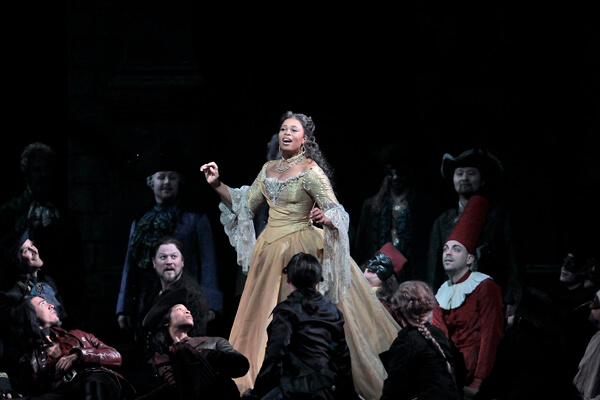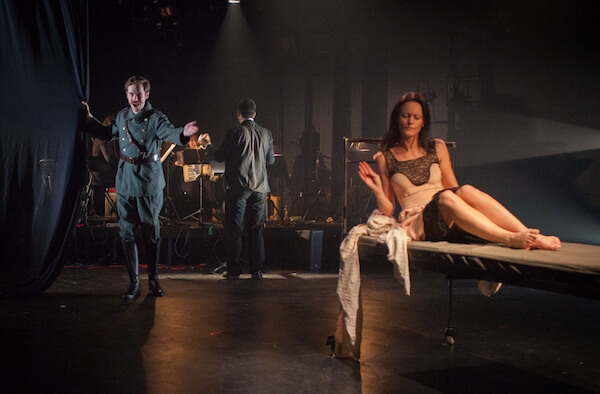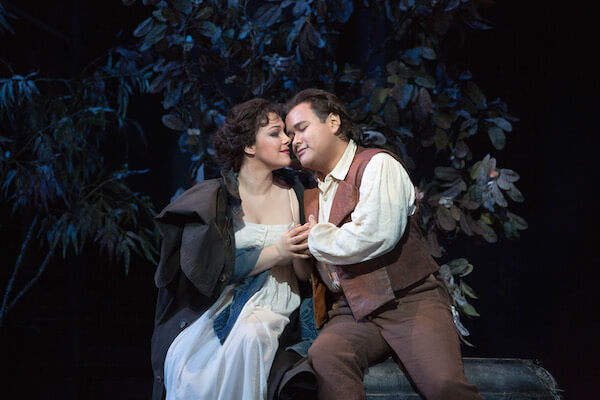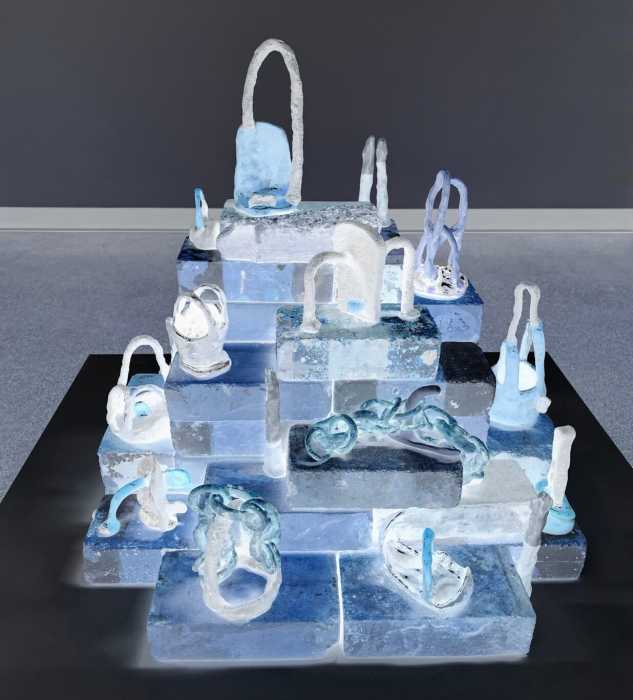Diana Damrau is fresh off her triumph in the title role of “La Sonnambula” and has a new CD she previewed at Le Poisson Rouge. | JOSEF GALLAUER/ DIANA-DAMRAU.COM
Undoubtedly one of the most exciting opera singers today, Diana Damrau just wrapped an ecstatically received run of performances of Bellini’s “La Sonnambula” at the Met –– and made her triumphant cabaret debut at Le Poisson Rouge, celebrating her solo album, “Forever,” which she calls “the soundtrack of my life.”
Opera singers are probably my favorite performers for interviewing. Movie and TV stars think it’s cool to give you 10 minutes, and Broadway actors deem half an hour more than sufficient. But opera folk are often just as generous with their time as they are onstage, and Damrau, un-chaperoned by press agent, met me for a delightful, completely relaxed conversation in the deserted Met Opera press room.
Most exciting soprano of the day, lady vets bloom, Liza’s act revived
When I called her a definitive Sonnambula, after catching her Saturday matinee performance, she tinkled her charming laugh: “Thank you! You know, I was supposed to make my debut in this role, not here, but in Barcelona. After working on it hard for a whole year, I got sick in January with bad bronchitis and everything you could imagine, so I had to cancel that production. But I ended up doing it here, and it was not bad.”
Not bad, indeed! I mentioned to her that, since seeing her Met debut in “Barber of Seville” in 2006, her voice seems to have really developed with a ravishing, silvery quality that pierces –– quite beautifully –– both the ears and heart, and she responded, “I feel my voice has grown probably due to two pregnancies and the hormonal change in my body. My teachers always said, ‘Your voice is going to develop, and you could even get into dramatic coloratura in stronger repertoire,’ but I prefer to stick now with the roles I can do with my voice, without going too far to the edge. Bel canto is at the moment my favorite kind of singing because you have to have the whole voice, from top to bottom, and be really in your fittest moment, and also artistically, because it’s all about singing and what you can express with it. And I really feel these roles.”
Her marvelously clarion “Sonnambula” tenor, Javier Camarena, was the perfect, thrilling partner for her: “He’s so warm as a person and also his voice, the brightness and the power he has in the high register. He’s a smart guy and an artist who comes from the heart and feels his roles. It was really nice to act and sing with him, and we really tried to find this loving couple. It was constantly growing until that last performance. Sometimes you have a partner who is going to sing this phrase just like this, always, and we’ll meet at the end or whatever. With him, it was like breathing together and being so connected, and waiting for: What is he or she going to do next? When something slightly changes, you adapt and then the thing is growing like a tree –– look, there’s a new flower and another! It worked out well, and now I will try more Mozart, and Strauss is coming and I’m ready for the next step.”
Damrau seems like the Betty Hutton of opera for the all-out way she throws herself into a role, like the cartwheel she performed at the end of “La Sonnambula.” I told her, “You really love to act, don’t you?”
“I try,” she replied. “I’m bad at just listening when I go to a performance and see the artist is not really into it and doesn’t touch me or is not really heartfelt. You have to use everything. We’re not just instruments who play just the melody. We have words and a story to tell and that’s what I really want to see.
“That cartwheel! Ohmigod, they originally wanted to lift me even higher than the previous two lifts they did and carry me to the side holding only my ankles. I was too scared and said, ‘I’ll do anything else, cartwheels, splits!’ I was screaming, so they said, ‘Okay, show us what you can do,’ and I did the cartwheel, and they bought it!”
About her cabaret debut, Damrau said, “I was again so scared, not used to performing in a space like this, a jazz club, really dark with red lights. We did a different repertoire, and you also have to be charming and say something. Don’t be stupid, sing well, be the entertainer, and there I was! It was also being live-streamed on the Internet, so no pressure at all –– ha ha! But I had such a great connection with my accompanist, Craig Rutenberg, and we really had fun!
“My dress was actually a skirt which I pulled up to make a bandeau top with a belt for a neck halter, high-heeled shoes, which hurt a lot and were sparkly, because you must go for that. I bought the dress during my pregnancy when I had concerts, nice to hide the belly underneath and also looks good.”
That “different repertoire” is what appears on her CD: “They originally wanted it to be all operetta, but there are already so many of those –– Schwarzkopf and Gruberova, everybody did one. I’m a child of my time –– I love operetta, but I first sang musicals, like my first opera house role, Eliza Doolittle, onstage more than operettas. So why not put this together? Let’s do some songs which have touched all our lives, so we start with operetta and musicals and then film songs. I wrapped them with two vocalises in order to show how melodies touch our hearts. It was really great fun to record this.”
Damrau is married to French bass-baritone Nicolas Teste: “In Geneva, he was Masetto and my first Donna Anna in ‘Don Giovanni.’ I always say Mozart was our connection: Donna Anna needs her Masetto!
“We have two boys, aged three and one and a half. At night, I’m nursing because he doesn’t want to stop and let Mama go. We are based in Zurich, but always take them with us, have the same manager, and try to organize it so we are in the same town or not far from each other. Next year, we will do ‘Manon’ at the Met together.
Damrau, who always sang and had a family filled with church and chamber orchestra musicians, grew up in a small town 100 miles outside of Munich. She became enamored of opera when, at 12, she watched the Teresa Stratas-Zeffirelli “La Traviata” on TV: “She was a great actress, and her beauty, which you need for Violetta, doesn’t work in a traditional production unless you look like a fragile ballerina. I want to grow back into a consumption Violetta, but I have to wait until [my son] Colin has finished drinking [laughs]. Stratas was the Violetta of my childhood, but when I listen to it now, with my knowledge, it’s so hard to be touched because I can see here she has technical difficulties, okay, yeah that does not work, the note is coming and I can hear it won’t work and it doesn’t. When you sit in an audience, people are crying because they just enjoy it. And oh! I want to cry, too, but when you know so much …”
In 2007, Damrau received the title of Bayerische Kammersangerin, the honorific name for prestigious Bavarian opera singers, and I always wanted to hear about the ceremony surrounding this special recognition: “Somebody from the Bavarian State gives you this honor with a little speech and that’s it. You don’t have to sing to prove that you’re worthy, just a normal ceremony –– no pressure –– and after, you get little canapes to eat and a glass of champagne!”
Damrau’s dream roles include “Juliette, which I must do one day, I love it. Maybe some more Strauss –– I’d love to do ‘Daphne’ –– but my real dream roles are Renato in ‘Ballo in Maschera’ and the Grand Inquisitor in ‘Don Carlo,’ perhaps in my next incarnation!”
When I told Damrau that she is a top diva favorite of gay opera lovers, she said, “Oh, that’s great! I’m Queen of the Night. Probably I’m gay, too! That makes me happy.”
The cast of the Transport Group’s “I Remember Mama,” including Phyllis Somerville and Barbara Barrie. | CAROL ROSEGG
Gay playwright John Van Druten continues to live on, enthralling audiences with the singular, salutary revival of “I Remember Mama” by the Transport Group (The Gym at Judson, 243 Thompson St. at Washington Sq. S., through Apr. 20; tranportgroup.org). His heartwarming Norwegian family saga is played by a cast of 10 lady veterans, whose combined years of professional experience, Barbara Andres, at the opening night party, told me –– with perhaps a touch of exaggeration –– exceeds 500 years. The entire cast did every role from beneficent Mama (played by Andres) to various aunts, husbands, drunken uncles, and little boys and girls to glowing perfection.
And the party was the coziest affair, with all these terrific broads kicking the hell back, like my beloved Lynn Cohen (Mags in “Hunger Games”), Barbara Barrie, Rita Gardner, and others who, as a young attendee observed, “You may not know their names but you’ve definitely seen them. A lot.”
Another veteran, Judy Kaye, delivered a solidly professional cabaret act at 54 Below on March 29, singing a wide range of material with an emphasis on Sondheim, from her challenging opening of “Another Hundred People” to a perfectly rendered “I Never Do Anything Twice.”
On April 4, Liza Minnelli’s 1977 vehicle “The Act” was dusted off for a concert revival there, in the very space where the star once spent many a 9 a.m. morning being spun around the dance floor by Sterling St. Jacques, as the knowing watched and commented, “Looks like somebody’s gonna miss their Sunday matinee!”
Standouts: Cady Huffman sizzling on “Arthur in the Afternoon” (although some day I’d like to see that sexy number performed with a straight guy, if one could be found) and Carole J. Buford, whose effervescent “City Lights” rather matched its original interpreter’s for sheer –– as Liza’s godmother Kay Thompson was wont to say –– “bazzaz.”
After a successful run, Jim Brochu’s wonderful, reminiscent show “Character Man” has sadly closed, but it went out with a bang at a fabulous party at a great new spot you all must check out. Moscow 57 (168 ½ Delancey St. at Clinton St.; moscow57.com) is owned by Seth Goldman and Ellen Kaye, whose parents had the Russian Tea Room in its glory days, and this absolute jewel box of a boîte is a tribute to that storied venue, with its red, Russian art-covered walls. Flavored vodkas, caviar, blini, and all manner of national deliciousness are on the bill of fare, making you realize that Vladimir Putrid can’t singlehandedly ruin an entire country’s heritage.
Kaye, who’s a terrific singer herself, is all about live music, and this place rocks nightly with an exquisitely curated selection of music makers.
Contact David Noh at Inthenoh@aol.com, follow him on Twitter @in_the_noh, and check out his blog at http://nohway.wordpress.com/.




































